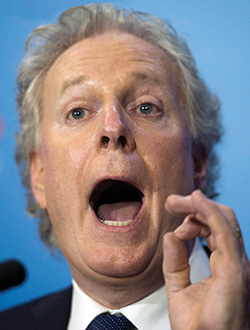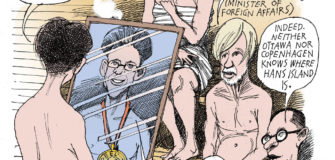Dancing Between Centre and Periphery

 GB talks politics, tactics and federal- provincial-international futures with the former Quebec Premier
GB talks politics, tactics and federal- provincial-international futures with the former Quebec Premier
GB: Where do you see Quebec in the year 2020?
JC: I see Quebec as part of Canada. There is little doubt about that. I see Quebec as being the entry point for Europe into North America – in part because of the success of the Canada-EU economic partnership that has just been approved-in-principle by Ottawa and Brussels. And I see Quebec as a place that will be an example of the proper northern development of resources and protection of the North’s delicate environment more generally. Take my government’s Plan Nord. It involved the biggest conservation project in history, with the protection of some 600,000 square kilometres of land. This is where I see Quebec – as a real energy powerhouse beyond just the rhetoric of clean, renewable energy.
GB: What about the internal composition of Quebec? How do you see that changing over the next couple of decades?
JC: The demographics of Quebec will be interesting, because we will have demonstrated through policies that government can indeed affect demographic trends. Our government did this through different policies aimed at helping women to enter the labour market – something that is critical given our ageing population. One of the outcomes of our policies was an increase in the provincial birth rate. The other piece of the demographic policy puzzle, for the times, is how we deal with people who are older and living longer (and in better health) in order to ensure that they are choosing to participate in the labour force. In the last few years, we introduced universal daycare, as well as a very progressive parental leave programme – as much for women as for men. We introduced family allowances. As a result, there was an increase in the number of women participating in the provincial labour market.
I should say that we also reduced poverty. The family allowance programme is weighted heavily in favour of low-income families. This has had a marked effect on the poverty levels in Quebec.
GB: What about the identity or even national question in Quebec?
JC: The identity issue will still be around in Quebec 20 years from now – even 40 and 60 years from now. Its character and intensity will vary, of course. I hope that, through all of the trials and tribulations, we in Quebec will have been able to move toward a society that is more and more inclusive. Through trial and error, we more or less came to a consensus – including on language questions. Now that consensus is being questioned by this new provincial government. I am very worried about the consequences of this government’s recent moves, including in respect of the Charter of Quebec Values – because this is being done not for high motives. It is being done for very partisan motives: to divide the population, rather than find some consensus and common ground. But to return to your question: the national question will be with us for many years to come. I just hope that it will unite us more than it will divide us.
GB: What about Canada in the year 2020? Where do you see it in the global context?
JC: This country has to get a lot more ambitious in respect of how it positions itself in the world. We need to realize that no one wakes up in the morning and thinks: “We should do a deal with Canada today.” This is simply the reality of our world. We are small in relative population. We have extraordinary resources and attributes. But Canada has to carve out a place for itself. And that includes making major investments in infrastructure that will attract people and investments. We should have built a high-speed train between Montreal, Quebec City and Toronto a long time ago. We also need to build up our ports, airports, and indeed the North. The North is going to become a major issue for Canada, given climate change and the opening up of the new sea routes. These new maritime routes in the North and Arctic will be a major political and strategic issue for future generations. This will have a profound effect on us: we need to get our heads around it, understand what it means, and protect our interests.
GB: Which countries impress you most in respect of how they manage federalism?
JC: Germany is probably the country to which I look most in terms of how power is shared between the Länder and the federal government. I like the format by which the Länder have representation in the federal parliament. I believe in a bicameral system. In that sense, I am quite distraught by the current debate in Ottawa on the Senate. Expense account abuses have now brought us to the point where we are willing to revisit the very basic foundations of federalism. I find it quite distressing to see the very low level of thought given to all of this by our political leaders. After all, the Senate was created for very specific reasons. And it serves its original purposes well. To think, also, that we are considering eliminating the Senate altogether when all serious people know that this cannot happen, constitutionally speaking, unless the provinces readily agree.
One of the basic tenets around which we all need to get our heads is that a country like Canada is, for all practical intents and purposes, run by the provinces. The day-to-day operations of Canada are driven not by the federal government, but rather by the provinces: daycare, education, roads, civil law – all of these are run by the provinces. This will not change. The federal government plays an important holding role – to be sure. But it makes great sense that we should have a Senate that is able to speak, in a balanced way, to the more regional forces in the country.
GB: What is the role of central authority, in the 21st century, in a territorially huge country?
JC: Its role is to coordinate a number of policies that should be universally available across the country, and to create the conditions that promote such coordination. Health care mobility is one such policy. Internal trade is another one. Everything that needs a central vision and effort to allow a seamless framework of policies in the country to be implemented is where the federal government has a legitimate role. In the case of Canada, the federal government has a role in terms of allowing us as Canadians to have a sense of country – of who we are, and what are our shared values. Of course, there are a lot of shared values that unite us. (Unfortunately, the real sense of country that the federal government ought to be promoting is something of which I do not see much these days.) Finally, of course, the federal government has a very important role in projecting Canada to the outside world – through diplomacy, defence and other means.
GB: Is there a linguistic competence issue in Canada, compared with other leading countries?
JC: We have some clear linguistic advantages. English has become the dominant language of business. That is an advantage for us. Canada also has this extraordinary asset of a second language – French. This gives us much broader reach in the world than many other countries. Canadians have very little understanding of how much this bilingual reality advantages us, and how much potential it gives us as a country. I have seen this both politically and in a personal way in business. In fact, I just finished negotiating an agreement in Senegal for a Canadian mining company. The fact that I speak French and know the Francophonie well was a major part of the reason for which I was retained to do this job.
As for a possible third language, I should say that Spanish has a not inconsiderable footprint in Quebec. My two daughters have learned Spanish. And the policy sell within Quebec on language is quite interesting: the pitch must be that we as a society need to learn not just two languages, but also three languages. English is perfectly fine, then, because it is packaged in the context of trilingualism, not bilingualism. The pitch would be: we should be learning Spanish. But to get to Spanish, we have to go through English. In that sequence, English becomes more acceptable to Quebeckers. If we speak only about learning English, however, then we are apparently being assimilated.
GB: What is the appropriate role of the provinces in international affairs, if the federal government has the presumptive lead on foreign policy?
JC: We should start with the basics: in the Canadian constitutional framework, the federal government has the ability to negotiate international agreements and treaties, but cannot commit a province to implement aspects of such agreements and treaties in that province’s areas of jurisdiction. So it is in the interest of the federal government to organize itself in such a way that the provinces are at the table when international negotiations happen. In principle, the federal government is not doing this. It did this in the case of the recent Canada-EU trade negotiations only because the Europeans forced Ottawa to bring the provinces to the table. Brussels made this a deal-breaker, because it knew that it wanted a comprehensive partnership and trade agreement, and that on issues like government procurement and many others, if the provinces were not present, then the deal would not be comprehensive and credible. Of course, the federal government does not have the option of rewriting the Constitution when it negotiates. But let me be clear: the federal government has not, to date, been up to the task of getting the provinces actively and seriously involved in international negotiations.
I myself have done a lot with Quebec internationally. I have had no inhibitions about being present, and this posture has served the interests of both Quebec and Canada. I have not seen the problem of encroachment. Instead, what I have seen is insecurity in Ottawa. Frankly, I think that Ottawa does not understand. It does not practice the federalism that the country has adopted in a lot of policy areas – including in international relations. This is because Ottawa has tended to work from the assumption that the provinces are going to go out there and say something contrary to Canada’s interests or, in a worst-case scenario, that a péquiste government will get elected and will proceed to say crazy things.
GB: Is there a role for regional or provincial governments in questions of war and peace?
JC: Less, I think. There are provincial or regional views on these matters, but policy questions in relation to war and peace – on national defence, for instance – are clearly within federal jurisdiction. But let us expand the logic a little with an example. If the federal government decides to get involved in, say, Haiti and to implement an aid programme, then we can rightly ask: where is Ottawa going to find the police officers who speak French and who will go to Haiti on a nine-month mission to train the Haitian police or security forces? Where is Ottawa going to find doctors and nurses to send? Answer: Ottawa clearly needs the cooperation of Quebec and the other provinces to accomplish many of its foreign policy goals. This applies to basic issues of national security as well, even if the constitutional lead in this domain is clearly federal.
GB: What is political leadership over the next 10 to 15 years? What are its basic characteristics?
JC: It is to anticipate change, and to make that change work for you. It is the ability to really look ahead, and to bring people to a destination: to rally them to a plan – to a project that advances the interests of the whole society. In a more negative way, political leadership is the ability to recognize that public opinion is not static. Leaders have the ability to influence and to persuade people of the value of their ideas, as opposed to simply trying to surf on the waves of public preferences. (Of course, we see a lot of this surfing today in politics. This is very discouraging, as it does not advance things.) To be sure, some leaders have to have the ability to stand up to public opinion that is contrary to their beliefs. They have to be ready to fight for their convictions. Otherwise, what is the point of running for office? What is the point of running for office if the main objective is simply to get into office? I thought that the main point of running for office was to defend ideas, and to gain support for those ideas.
GB: What is the appropriate trade-off or tension between democracy and technical expertise in a 21st century state?
JC: That is a very interesting and complex question for those of us who believe in democracy. In looking at some of China’s successes and the Arab Spring’s disappointments, we are learning about ourselves. We are learning that the belief that the democracy we experience and in which we so strongly believe is instantly exportable is naïve. In modern democracies, there is first and foremost a culture of democracy. That culture of democracy is not something that you can just hand over to someone else. It needs to be nurtured and developed, and taught and adopted. If it is not, then other societies will not live by the same rules and norms that we enjoy. As such, there is now a sudden realization for many of us in the West to the effect that we were probably pretentious in our view that democracy is what is right for everyone else. We believe in democracy, yes. But that is not enough to make democracy automatically right and appropriate for other societies – again, in the absence of these enabling conditions. Democracy must be developed over time. It cannot simply be imposed or transferred.
GB: What is the best way to keep a complex country like Canada united – particularly in respect of the Quebec question – in this new century?
JC: There are two things for which all minorities strive: recognition and respect. Minorities want to live in a place that they recognize, and where they feel that they are respected. Consider Canada’s First Nations. What do the First Nations look for? Answer: recognition and respect. It is not about money or more political or constitutional power. In the end, it is about the sense that they are recognized and respected. This requires an effort by society to ensure that minorities are recognized not only in speech and words, but in deeds. That is the thing that Quebec has sought most within Canada. And this has not always been understood. Indeed, there has been a failure on the part of a number of Canadians to understand this basic reality.
![]()
Jean Charest is the former Premier of Quebec and partner at McCarthy Tétrault LLP in Montreal.









